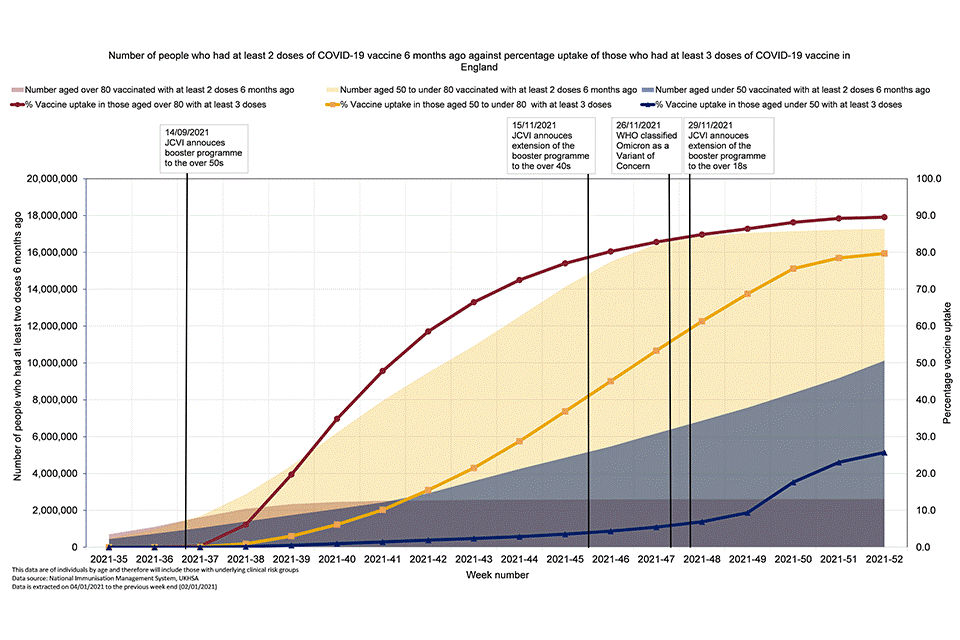JCVI statement on the adult COVID-19 booster vaccination programme and the Omicron variant: 7 January 2022
Published 7 January 2022
Throughout the pandemic the Joint Committee on Vaccination and Immunisation (JCVI) has provided advice to the UK government on vaccination against COVID-19, with the primary aim of reducing severe disease (hospitalisation and mortality) across the population. COVID-19 disproportionately affects those in older age groups, residents in care homes for older adults, and those with certain underlying health conditions (persons in clinical risk groups). For this reason, these groups have been prioritised for vaccination across all of JCVI’s advice.
Overview of the adult programme
In December 2020, JCVI advised phase 1 of the COVID-19 vaccine programme to offer primary course vaccination comprising 2 doses of vaccine to those aged 50 years and over, and those in clinical risk groups, with priority given to those at the highest risk of severe disease. Ahead of the completion of phase 1 (in April 2021), JCVI issued final advice on phase 2 of the programme to vaccinate all adults aged 18 to 49 years who had not previously received a vaccine. Phase 2 aimed to further reduce morbidity from COVID-19 in the population.
In June 2021, JCVI issued interim advice on a booster programme, aimed at maintaining protection against COVID-19 through winter 2021 to 2022 and further into 2022. This advice was finalised in September 2021, setting the priority for booster vaccination beginning with the most vulnerable persons in the UK population; specifically all adults aged 50 years and over, and those in clinical risk groups. Booster vaccination was timed at 6 months after completion of the primary course based on evidence of some waning of protection against severe disease from wildtype virus and existing variants of concern, including Alpha and Delta, in older adults 6 months beyond primary vaccination. Delivery of the booster programme started immediately following the issue of advice.
In November 2021, once substantial progress had been made in providing booster doses to those most vulnerable to severe disease (older adults and those in clinical risk groups), JCVI advised extension of the booster programme to those aged 40 to 49 years, with the aim of further increasing population immunity against morbidity and mortality from COVID-19.
On 26 November 2021 the World Health Organization classified a new variant, Omicron, which was spreading rapidly in a number of countries. The Omicron variant is significant for the many mutations affecting the spike protein compared to the wildtype virus protein upon which the existing COVID-19 vaccines are based. In response to the threat from Omicron, on 29 November 2021, JCVI advised both extension and acceleration of the booster vaccination programme; advising:
- all adults aged 18 years and over be offered booster vaccination in descending age order
- a reduction in the interval between primary and booster vaccinations from 6 to 3 months
Chart 1: booster programme eligibility and coverage since September 2021 over time

Booster programme effectiveness
Thus far, the booster programme has provided high levels of protection against severe disease from COVID-19 (both Delta and Omicron variants) across the population. The latest data from the UK Health Security Agency (UKHSA) indicates that while protection against mild symptomatic infection appears to wane substantially by about 3 months after the booster dose (~30% vaccine effectiveness), protection against severe disease (hospitalisation) is well maintained in older adults (~90% vaccine effectiveness) (see Monitoring reports of the effectiveness of COVID-19 vaccination). This data underlines the importance of booster vaccination and the additional protection obtained against the Omicron variant.
Ongoing review of further booster doses
Given the clear importance of booster vaccination in protection against severe disease from Omicron, JCVI has reviewed the potential health benefits of an immediate additional booster dose for the most vulnerable persons in society in response to the current Omicron wave. At this present time, JCVI advises that the priority for the COVID-19 booster programme remains increasing coverage of the first booster dose across the adult population, particularly in older adults and those in clinical risk groups. In addition, it is important that unvaccinated individuals, especially vulnerable adults, receive a primary course of vaccination, irrespective of whether individuals have had previous infection.
In its review, JCVI considered that:
-
the booster programme, which started in September 2021, is still providing very good protection against severe disease, including in older adults (see Monitoring reports of the effectiveness of COVID-19 vaccination)
-
an immediate second booster dose of vaccine in the most vulnerable (those over 80 years or in a care home for older adults) would provide only limited additional benefit against severe disease at this time
-
an immediate second booster programme for the most vulnerable would add to the significant existing operational pressures for the rest of the COVID-19 vaccine programme and other health services
-
the current Omicron wave is progressing very swiftly, offering limited time for additional vaccine programme measures to have a substantial impact within this wave
-
the main aim of the vaccination programme remains prevention of severe disease; protection against mild or asymptomatic infection with existing vaccine products would require regular (perhaps as frequent as 3 monthly) booster vaccinations which is not considered a sustainable long-term strategy
-
alternative vaccines, including variant specific vaccines, may become available during 2022, and may be better suited to providing long-term protection against the Omicron variant, or other novel variants
JCVI will continue its rolling review of the booster programme, particularly in relation to the timing and value of any second booster doses for the most vulnerable. This is an evolving situation. Additional rapid response measures may still be required if there are substantial changes in our understanding of vaccine protection against the Omicron variant, or major changes in the unfolding epidemiology of COVID-19. In the meantime, the latest data is reassuring, and provides confidence that the booster vaccination programme has greatly strengthened population immunity against severe illness from COVID-19, including against the Omicron variant.
